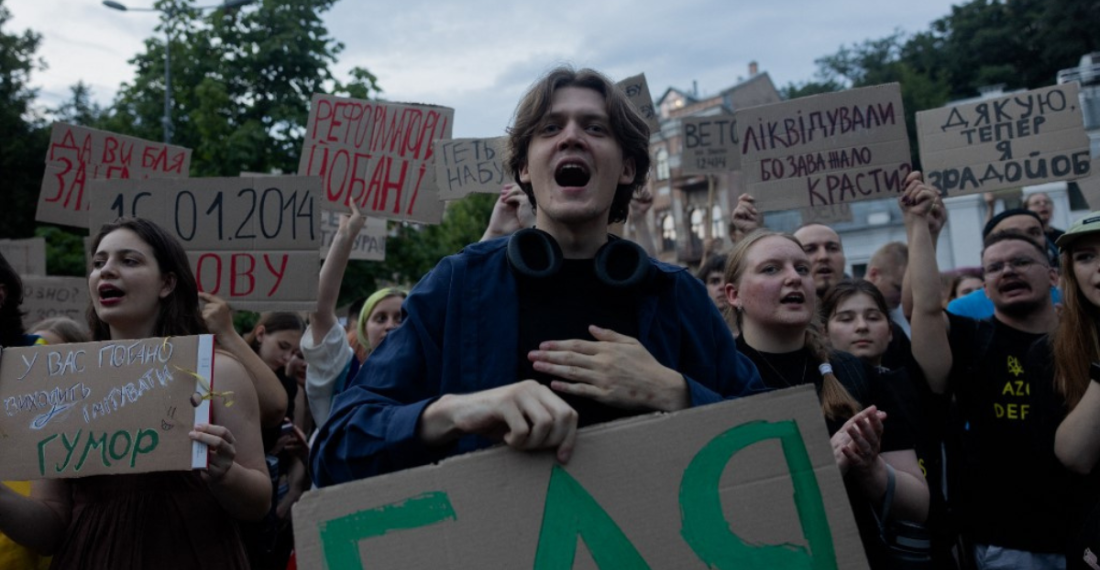Ukrainians are taking to the streets to protest a new law they worry will undermine the work of two key anti-corruption agencies and erode the independence of bodies meant to provide a check on power. Protests are growing and spreading around the country even as President Volodymyr Zelenskyy offered a vague new bill to alleviate demonstrators’ concerns. After a day of pressure from Ukrainian citizens, the European Commission and many European governments, Zelenskyy said he “heard the public opinion” and promised to fix the situation with a new bill that he pledged would preserve the independence of corruption agencies.
Discontent over the law led to the first major demonstration against the government in more than three years of war, marking the most serious fracture yet in the national unity that has helped Ukraine resist Russia’s invasion. President Zelenskyy defended the law as necessary to remove “Russian influence” from the fight against corruption, though he didn’t provide examples of such interference, according to AP.
Thousands of people showed up in Kyiv, Lviv, Dnipro and Odesa, and even the frontline city of Kharkiv near the Russian border, a day after Zelenskyy signed the original bill that critics said undermined the independence of the National Anti-Corruption Bureau (NABU) and the Special Anti-Corruption Prosecutor’s Office (SAP).
“We heard what people are saying these days, what people are saying on social networks, to each other, on the streets. All this is not in vain. We have analyzed all the concerns, all the aspects of what should be changed,” Zelenskyy said in a video address on Wednesday evening, as protesters chanted on the streets outside his office.
Zelenskyy said that after a day of talks with affected parties, he will soon propose a bill to the Ukrainian parliament that will be “a response to the situation, and will provide strength to the law enforcement system. All the norms for the independence of anti-corruption institutions will be there,” Zelenskyy said. “This will be a presidential bill, and we will implement it within the framework of our strategy for transforming the state,” Zelenskyy added, providing few specifics and no deadline for the new bill.
The NABU and SAP supported Zelenskyy’s pivot, saying they are ready to join the discussion and preparation of a legislative solution that will eliminate legal risks, meet rule-of-law standards and provide greater potential for guaranteeing justice in Ukraine.
But Zelenskyy’s sudden concession did not calm the streets, as protesters demanded to see the law first. “Until we see the text, it’s hard to assess it, or even whether it will happen. There’s no faith in Zelenskyy! We need to keep pushing,” Ukrainian war veteran Oleh Symoroz said on social media.
Some opposition lawmakers called on protesters to demand an urgent parliament meeting to reverse the controversial law that drove Ukrainians to their first anti-government protests since Russia launched its all-out war in 2022.
Top EU leadership had urged Zelenskyy on Wednesday to prove he is still committed to European democratic values after signing the inflammatory law, which European allies including Germany said threatens to fatally undermine Ukraine’s ongoing bid to join the bloc.
The Ukrainian branch of Transparency International also criticized the law, saying it undermines one of the most significant reforms since the 2014 uprising and that it damages trust with international partners.
Fighting entrenched corruption is crucial to Ukraine’s bid to join the European Union and maintain access to billions of dollars in Western aid. In a post on X, EU Enlargement Commissioner Marta Kos called the new law “a serious step back.”
The action against the agencies comes only a month after the NABU launched a criminal investigation into then Deputy Prime Minister Oleksii Chernyshov, one of the highest-profile corruption cases since Zelenskyy took office. Chernyshov has denied the allegations but was removed from his post during last week’s government reshuffle.
It also follows the arrest of two NABU officials on suspicion of having ties to Russia by Ukraine’s Security Service.






